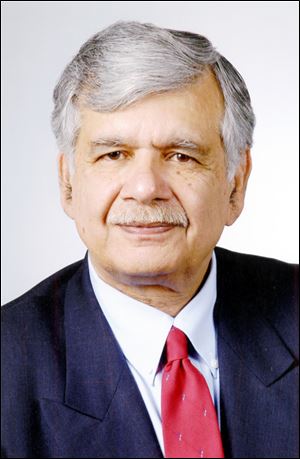
Military rule’s return in Egypt is repeat of history
2/17/2014
Hussain
A few weeks ago, Egyptians went to the polls — for the second time in two years — to vote on a new constitution. A decisive majority of Egyptians approved it, just as they had approved the previous one in 2012.
This new constitution paves the way for the armed forces to run the country again, as they have since the military revolution that toppled the monarchy in 1952. It also makes sure that the Muslim Brotherhood will not again emerge as a political force, as it did in the aftermath of the Arab Spring three years ago.
The Brotherhood has been a thorn in the side of all Egyptian rulers since 1952. During the prolonged military rule, the Brotherhood was brutally suppressed.
The caretaker government has not given clear and convincing reasons for the removal of former President Mohammed Morsi. The charges against him include murder, escape from jail, and sundry crimes that point more to the desperate political maneuvering by the current rulers than the severity of his alleged crimes. Mr. Morsi has been in military custody since the coup last year.
Before the dismissal of President Morsi, there were widespread demonstrations against his government. The demonstrations, according to many observers, were orchestrated and planned.
They were staged, so it seemed, at the behest of the army. Whether spontaneous or staged, the demonstrations point to a dangerous precedent.
Most Egyptians who voted for the Muslim Brotherhood in 2012 knew the ideological underpinnings of the party. It won election, and thus the right to rule the country.
If Mr. Morsi’s government could not perform to the satisfaction of most Egyptians, it could have been defeated at the next election. Allowing a minuscule slice of 82 million Egyptians to take to the streets and change the political landscape negates the foundation of a representative government.
It’s a paradox: looking the other way when democracy is derailed in Egypt, but holding tight to power when massive demonstrations were held in the United States and many capitals of Western Europe against the impending invasion of Iraq in 2003.
If democracy is sacrosanct, and I believe it is, then the countries that preach the mantra of democracy should have condemned the military coup in Egypt.
It is often said that the Muslim Brotherhood would have turned Egypt into a theocracy, just as the Taliban did in Afghanistan in the 1990s. But most observers agree that the Muslim Brotherhood was not trying to emulate the Taliban.
Most Afghans — and for that matter, most Muslims, including Egyptians — do not subscribe to the version of Islam practiced and enforced by the Taliban.
One significant blemish on Mr. Morsi’s government was its relative inability to protect religious minorities adequately.
In Turkey, an Islamist government has ruled since 2003. Mustafa Kemal Ataturk laid the foundations of modern Turkey after World War I, when the once mighty Ottoman Empire was dismembered. Mr. Ataturk banished religion from the public square and declared Turkey a nonreligious, democratic, secular state.
Between 1960 and 1997, the Turkish army — which considers itself the custodian of the country’s Kemalian legacy — staged four coups against democratically elected governments. In 1960, the army executed then-Prime Minister Adnan Menderes.
Officially, all Turkish governments since 1923 have underplayed the role of religion, but people remained connected to religion and religious traditions. So when the religious Justice and Development Party emerged in the late 1990s, people welcomed it.
The party, led by Prime Minister Recep Tayyip Erdogan, has kept Turkey secular and democratic during its decade-long rule.
All dictators believe they are indispensable to the stability and prosperity of their countries. They use different tactics and means to perpetuate their rule.
And because most dictators come from the military, they allow the armed forces to infiltrate the economic life of the nation. The Egyptian armed forces control as much as 40 percent of Egypt’s economy.
Egyptian strongman Gen. Abdel Fattah el-Sisi most likely will be the next president of Egypt. Crowds of jubilant Egyptians will welcome him as a savior.
In the meantime, he has given himself a few more stripes and promoted himself to the rank of field marshal. It seems history does repeat itself.
Dr. S. Amjad Hussain is a retired Toledo surgeon whose column appears every other week in The Blade.
Contact him at: aghaji@bex.net